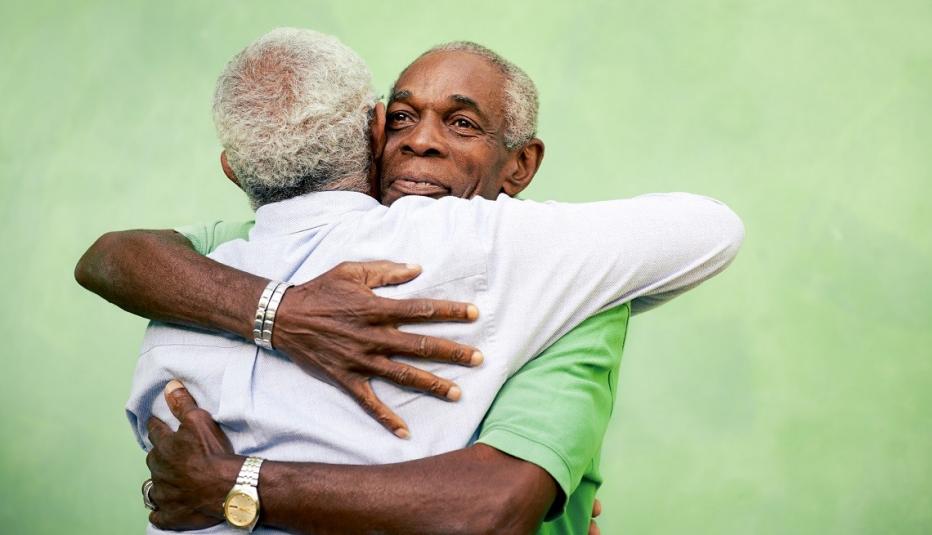AARP Hearing Center


Results of a national survey of Black LGBTQ Americans reveal that most are proud of their identity, but they often encounter discrimination, and many feel they cannot be themselves in settings typically central to people’s daily lives. Many are also unable to translate their high levels of education into more income or home ownership.
In a survey of over 1,800 Black LGBTQ adults conducted by Community Marketing Insights and sponsored by AARP, the Human Rights Campaign Foundation, Freddy Mac, Wilson Media, and the Center for Black Equity, more than 92 percent of respondents said they feel pride in being an LGBTQ person. Yet, only about half believe they can be themselves at work, school, or in their neighborhood.
Within their families, 59 percent of participants said they are fully accepted by their siblings, 42 percent by their parents, and 20 percent by their grandparents. Acceptance was much lower among those who were transgender or non-binary, according to the research.
Living situations for those in the Black LGBTQ community are diverse. Most are single—men more than women—and 40 percent live alone. About one-third of those surveyed have children; others live with partners, parents, other family members, or friends. About two-thirds live in urban areas and one-third have experienced homelessness.
Common Experience
Many participants indicated they face challenges because of their identity.
Three out of four Black LGBTQ Americans said they have encountered discrimination (racial, sexual orientation, gender, gender identity, or age discrimination) in the past three years. This most often occurs in the workplace or when they are in situations as consumers, such as at a store or restaurant, the survey finds. About half of the participants (47 percent) reported recent racial discrimination or prejudice from within the LGBTQ community.
Younger Black LGBTQ participants experienced higher levels of discrimination when looking for employment or on the job. Among those over age 45, about half fear racial or sexual orientation discrimination if they enter an assisted living facility. And the concern is even higher for older transgender and non-binary Blacks in the U.S.
While 70 percent of those surveyed said their city or town was supportive of its local LGBTQ community, just 55 percent believed the municipalities were supportive of its local Black community. An even smaller number (42 percent) indicated support for the local Black LGBTQ community.
Education is often viewed as key to economic success, but the payoff has not been as great for many Black LGBTQ Americans.
The survey finds 84 percent of respondents pursued education after high school and 48 percent earned at least a bachelor's degree or greater. Educational attainment was higher among cisgender lesbian people. Lower rates of completion by transgender and non-binary Blacks suggest a need for additional emotional or financial support to boost graduation rates.
According to study respondents, 44 percent of those surveyed carry student loan debt, 55 percent have a credit card balance, and only 11 percent are debt-free.
Debt and employment discrimination may explain, in part, why income is lower for this community than Americans in general. In 2019, the median household income was $59,400 for the Black LGBTQ community, compared to $68,700 for Americans overall and $45,400 for all Black adults in the U.S.
Home ownership is substantially lower for Black LGBTQ Americans. Just 33 percent own the home in which they live, in contrast to 42 percent of Blacks and 65 percent of Americans overall. However, researchers note that Black LGBTQ people are more likely to live in big cities where home ownership is less common and are less likely to be married or have children, which are key drivers of home ownership.
The financial fallout from the pandemic has been mixed: 32 percent of study respondents said they are doing better than last year, 41 percent about the same, and 27 percent worse.
Connectedness, Inclusivity, and Being Active
As for advocacy and social action, only about one-third of respondents said they feel connected to LGBTQ political or social organizations. Three-quarters participated in some type of Black Lives Matter activity. At the top of their political agenda: discrimination and police violence.
The results reflect a need for all LGBTQ organizations to be more representative and inclusive of the Black LGBTQ community. Most participants (78 percent) believe companies are not doing a good job in their outreach efforts to Black LGBTQ Americans. Genuinely listening and understanding the community ranked as the top tactics needed to reach the community, followed by supporting non-discrimination laws and policies, according to AARP.
The AARP sponsored online survey of 1,815 Black LGBTQ adults in the United States was conducted in September and October of 2020. Results were weighted to balance opinion by gender identity and age. The respondents included cisgender gay/bi+ men, cisgender lesbian/bi+ women, and transgender and non-binary participants and results are representative Black LGBTQ adults who consider themselves “out.” About half of the respondents (56 percent) considered themselves “fully out” and the remainder were at different stages of being “out.”
For more information, please contact Cassandra Cantave at ccantave@aarp.org. For media inquiries, contact media@aarp.org.































.jpg?crop=true&anchor=13,195&q=80&color=ffffffff&u=lywnjt&w=2008&h=1154)































